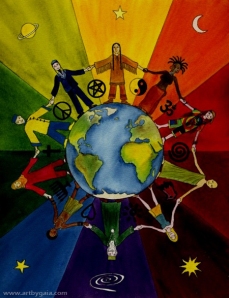By Enrique Lescure
Introduction
Our current civilization does not any more even try to answer what the meaning of life is, though there are three implicit answers. The first answer is “success”, the second answer is “happiness”, and the third answer (which dominates within academia and culture) is that life is “meaningless”. The two first answers are entirely focused on the individual’s role in life, and the third answer is more related to our lack of a common civilizational project.
Do we even continue to try to answer the question of the Meaning of Life? Or is there nothing less left but to focus on one’s own life to avoid staring into the Void of meaningless?
I would argue that the emphasis on individuality and nihlism that underpins much of (post-)modern western culture is slowly degrading our concept of past, present and future, and relieves us of a core that can fill our identities with meaning. On the other hand, spiritual and attempts at holistic explanations of existence have most often resulted in oppression and exclusion of individuals from the common ground of existence.
I believe that we need to transform ourselves into a new culture (like many others within academia and within the culture sector). But this process I believe needs to be profoundly based on construction of a new base for human identity – what it means to be a human being on this our Earth, rather than deconstruction.
I would argue that instead of trying to understand the term “meaning of life” in a rational manner, we should try to reach it through experiencing life, and that rather than Life standing on the fundament of a Meaning with a big M, any meanings in the Cosmos – no matter what they are and how you choose to pursue them – is but a part of the greater kaleidoscope of Life with a big L.
The basis of existence
From the dawn of our ancestors when they first stood up and looked towards the stars, humans have been more than just economic creatures. Early tribal societies (of which many still are existing on the planet) imagined the world as imbued with spiritual meaning, and consisting of more than just the world that our five senses could monitor. Shamans could access the other-dimensional realm through chanting and hallucinogenic drugs like Ayahuasca (banisteriopsis caapi). This allowed them to gaze into their own minds in an altered state, but also opened up the opportunity for human imagination and therefore the opportunity for culture to develop.
Today, science have revealed real and hypothetical dimensions which we could not have imagined half a million years ago, like the sub-atomic Quantum world which forms our existence but yet does not adhere to the Einsteinian theories of General Relativity, and like the hypothetical string dimensions. We have also realised just how small we are in comparison to the Universe.
Early human beings had no sophisticated tools or scientific teachings to guide them. All they had to judge their reality was their minds and what they could see around them. Since most human beings work on the basis of a Theory of Mind, where they ascribe to other individuals the same emotions and thoughts as themselves. Some researchers mean that Theory of Mind explains the origin of the first religions. When the tiger ate children for example, it was not interpreted as the tiger being hungry, but that the tribe had wronged the tiger in some way, by for example either over-hunting in the area, or by not making the correct rituals.
The same for natural phenomena like lightning, volcano eruptions, fire and earthquakes. These events were seen as a sign of displeasure, and soon the early humans came to imagine that there existed spiritual beings which interacted with them and held tremendous powers. These beings became angry or pleased with how humans acted. In many ways, the morality and Super-ego (Freudian term) of the collective consciousness of the tribe came to be associated with these spirits – which eventually turned into more or less antropomorphised deities.
The meaning of life in primordial societies (which we can study because there still are existing stone-age cultures on Earth), was largely centered around the idea that there was a spiritual world, inhabited by animal spirits, nature spirits and ancestors, and that the delineations between these groups were fluid. These realms could be accessed by shamans and those initiated in the mysteries, and could also make contact with people through dreams. Therefore, it followed that the meaning for the individual was to live in balance with his or her local environment, and to act for the survival of the group.
Spiritual Pessimism; The Traditionalist outlook
Civilization has existed on Earth for 12,000 years, but only for the last third of this period do we have any written records, which makes it difficult to access what cultural and mental processes that happened during the 8.000 year transition between hunter-gatherer societies and city-states with strong central governments, cadres of bureaucrats and developed state religions, which we arguably can find both in the early Egyptian, Sumerian and Harappa civilizations. The author Robert Graves has hypothesized that during this period, matriarchal and patriarchal cultures were in a state of conflict, and that the mythologies we learn about in Latin classes are derived from this conflict, though his views have been criticised due to conflicting archaeological records.
By the time that written language had been established in the Middle East, in India and in China, there was already a shared mythos of loss and sadness (JRR Tolkien partially based his fantasy mythos around early mythologies), and all cultures – no matter whether Greek, Aramean, Mesopotamian, Iranian, Indian and Sinic – were centered around the idea that reality was a process of near-constant degeneration. Originally, humanity arose in a Golden Age, when we lived in harmony with nature and with the Gods, did not have to work, and all humans were morally upright.
Either through an act of Original Sin (Christian and Islamic interpretation) or through the unstoppable tide of time (Hinduism, Eastern Teachings), we started to degenerate and separate ourselves from the divine and spiritual reality. All traditional Eurasian cultures were built on the dichotomy of Spirituality vs Matter, where the first was seen as pure and the second seen as filthy. There was also a latent conflict between Civilization – which was seen as ordered, masculine and patriarchal – and Nature, defined as chaotic, feminine and matriarchal (an inversion of the hunter-gatherer’s reverance of Mother Nature and feminine spirits).
 The agricultural civilizations of pre-industrial Eurasia were also strictly hierarchical, and not only in an economic sense. Human beings were being seen as being of different spiritual quality due to their heritage. Kings and Nobles were seen as spiritually superior beings to warriors, which were seen as spiritually superior to commoners. The lowest social status was either given to peasants (as in Europe) or merchants (as in many eastern cultures).
The agricultural civilizations of pre-industrial Eurasia were also strictly hierarchical, and not only in an economic sense. Human beings were being seen as being of different spiritual quality due to their heritage. Kings and Nobles were seen as spiritually superior beings to warriors, which were seen as spiritually superior to commoners. The lowest social status was either given to peasants (as in Europe) or merchants (as in many eastern cultures).
It can be seen as moving against the Christian and Islamic doctrines of equality before God/Allah, but many pre-monotheistic social beliefs survived the ascent of Monotheism. The touch and saliva of the French King was thought to cure Leprosy and Blindness for example, and this ritual during the coronation of Reims was held as late as the 18th century, when the world stood ready for the Industrial Revolution.
It can be said that the world-view of traditionalist societies of Eurasia was based on a dualism between spirit and matter, masculine and feminine, and that the meaning of life for the individual was to fulfill their assigned role in the community, and for the community as a whole to adhere to the moral and spiritual values of the Tradition. This was however seen as partially futile, since the world was headed towards more and more spiritual degeneration anyway. At the end however, the world would be burnt by a Destroyer (Jesus/Isa in Christian/Islamic eschatology, Kalki in Hindu myths), and reborn as a pure spiritual place where the minority of survivors would live in harmony with the Divine Principles.
Thus, the world is seen as imperfect, tainted and impure, and humanity is seen to be on a degrading journey towards lower and lower levels of spirituality.
Optimism; The Modern Vision (1648 – 1945)
It could be said that modernism was born after the destruction of medieval Europe, and died after the Second World War, which were two events that have served to define what we today know as “the Western Civilization“. During the latter half of the 17th century, Religion had exhausted itself in Europe – both as the foundation for political ideologies and as the value system. This was partially due to the growth of the wealth of the urban burghers and traders at the expense of landed and ecclestial nobility – but would most likely not have happened if it wasn’t for the Wars of Religion which had been fought since Martin Luther’s Reformation.
These Wars transformed Europe, both ideologically and socially. They were extremely destructive, and saw to it that the population of Central Europe imploded. Out of the ruins emerged a new order with centralising nation-states, absolute monarchies and a reversal of the roles of Church and State. During this era, the mechanical and scientific revolutions began, as well as the beginning of Enlightenment Thought.
The world was increasingly seen as an automated clockwork, and not a process directed by an intelligent Creator. Animals and plants were seen as operating and self-replicating machines, and were deprived of any spiritual or moralistic meanings – and more and more areas became the subject of scientific inquiry. The world was fragmented into academic disciplines, which were increasingly separated from one another. As this process continued through the generations, it gradually transformed Western Civilization from the medieval Christian values towards the modern outlook, the trinity of Science, Liberal Democracy and Market Liberalism. 
Characteristic for the outlook of these values was a sense of Optimism, that we were going to use reason and our mental faculties to solve all social problems, and that this would inevitably turn into a united Earth ruled by progressive values, as outlined by amongst others H.G Wells and Karl Marx.
This world is basically the world envisioned by Buckminster Fuller and by TV Series like Jetsons and Star Trek, the world of flying cars, mega-skyscrapers and pristine modernist landscapes, where people are living homogenously in sleek habitats which are designed for a maximum of comfort. It was partially realised through public housing in the Western World and throughout the old Eastern Bloc.
The meaning of life according to Modernism was to transform the world into a Utopia, and to eliminate all social ills and achieve the highest possible standard of life for all human beings. Marxism-Leninism and Fascism were both modernist ideologies which revolted against the Liberalism which had been dominant during the 19th century.
Nihilism; The Post-Modern Nightmare
Already Friedrich Nietzsche warned that the focus on rationality and scientific enlightenment could lead to a loss of meaning of the human existence. Collectively, this process came into fruition during and following the World Wars, when human beings were slaughtered on an industrial level (in the US, Vietnam played a bit of the same role at a latter phase). Post-modernism rejected the idea of continuous progress, and even the very definition of progress. But while deconstructing the progress paradigm, Post-modernism offered no constructive alternative for human existence, or the human relationship with society and with existence.
While the existentialists have offered Liberty of Choice (in a “meaningless world”) as a credo, the main message of our  Civilization is (of course) not that humans should rebel against the institutions, but that they should (implicitly) strive towards certain ideals, not for society as a whole to live by, but for themselves. These implicit ideals are bombarded into our minds through city billboards, neon signs, TV, Radio and the Internet, and are centered around the Cult of the Celebrity.
Civilization is (of course) not that humans should rebel against the institutions, but that they should (implicitly) strive towards certain ideals, not for society as a whole to live by, but for themselves. These implicit ideals are bombarded into our minds through city billboards, neon signs, TV, Radio and the Internet, and are centered around the Cult of the Celebrity.
This “individualistic consumerism” is based around the life opportunities of human beings in societies with large middle classes, and is targeted towards the creation of life-styles which people adopt as their identity. This means that a person’s identity inside Western Civilization is defined not out of the person’s relationship with themselves, with their community or with reality, but rather from their relationship to commodities and brands.
In terms of a wider meaning, it is implicitly stated that the society we are living in today has largely reached its final form, and that the struggles which are left are emancipatory – to include oppressed minorities inside this middle class (which becomes evermore and more fictious as the debt bubbles are growing and growth is stagnating). In terms of revolutions in other countries, the implicit purpose of these revolutions according to the ideals professed by our civilization is that these countries and cultures should move towards Individualized Consumerism and become a part of what will one day become a one-world civilization.
Our message; Life is meaningful
Imagine for a moment a Universe with no life at all. Only a frozen void, stars strown around too far from one another, and lonely rocks whirling around slowly throughout space, existing for no one to ever see or experience. No emotions of love, passion, only an eternal lonely coldness.
Then, on one barren world, in a single driplet of water, something happens…
Life is meaningful, because it offers us the opportunity to create ourselves. It offers us the opportunity to grow, to learn, to spread our wings and fly. Without life, there would be no experiences, no emotions, no culture, no myths, no songs. Nothing. There would be no diversity of living beings. There would be no joy in sunrises, in strawberries, and in the stars strown above the sky – many of which also have beautiful worlds where friends we have not yet met are living.
The Universe is not barren. It is very likely that it is teeming with Life, an eternal symphony of a Billion worlds. Or, we might be alone in the Cosmos, but that only makes Life the more valuable if that was the case. Thenceforth, we must protect worlds with Life, and carry them like our children.
Life is the most wonderful, most valuable thing in all of Cosmos, and it is its own meaning. The meaning is to branch out, to grow, to spread Life where there is none, and to turn barren worlds into beautiful Terras and Gardenworlds. It is valuable because it offers us the opportunity to exist, to feel, to think and to create. What turns life “ugly” and “meaningless” is not Life in itself, but the way in which we have created abstract cultural and social values to limit ourselves, while in truth we should create our values around Life.
We have – as an intelligent Civilization and as intelligent, empathic beings – one responsibility. And that responsibility is to create around us the best possible conditions for Life to flourish. It is unworthy of Humanity to destroy the planet, in the service of maximising economic growth. To deplete our fresh water reservoirs, destroy the eco-systems, erode our soils, murder the Oceans, spread mono-cultures and disturb the climate on Earth.
We are incredibly powerful beings today, and we have the capacity to create a sustainable civilization on Earth. But first we need to have a value system that puts Life in itself as the foundation of our existence. We can learn about and explore Cosmos, and in the future we might even meet other races from beyond the Stars. At the end, we might find ourselves as a part of a Milky Way Galaxy filled with advanced civilizations that all represent a wonderful diversity that goes further than what human imagination could fathom.
The meaning of being human should be to guard Life, to create the conditions to make Life flourish, and to enjoy Life, because Life is beautiful.
And there does not need to be an abstract meaning beyond that.












































![storming_the_bastille[1]](https://eoshorizon.files.wordpress.com/2014/10/storming_the_bastille1.jpg?w=300&h=224)







